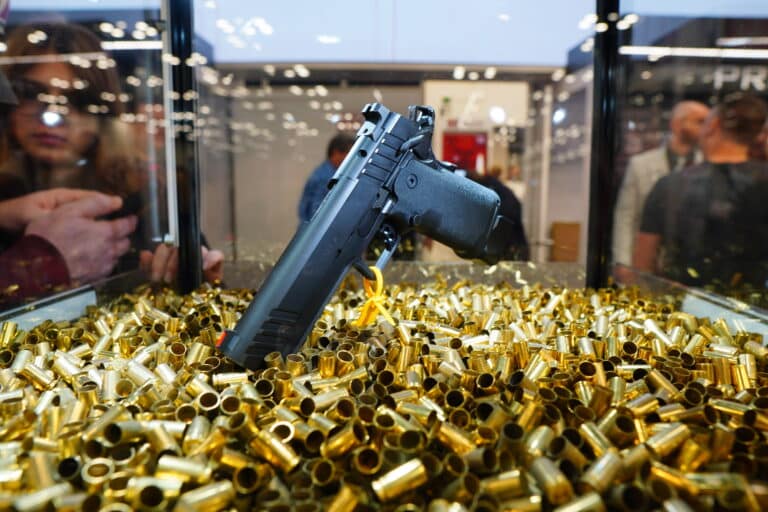The Volunteer State is the place to watch for the country’s most interesting gun law debate right now.
As gun policy moves forward along preestablished partisan lines in red and blue states, Tennessee is the one place where a policy outside those lines has some chance of passing. Republican Governor Bill Lee, motivated by last month’s Nashville school shooting, is pushing the Republican-controlled legislature to pass a modified “red flag” law, which he has relabeled an “order of protection” law. But, unlike many previous proposals, Lee appears to be working to address common critiques levied against the temporary gun confiscation orders.
“Throughout the last couple of weeks, I have worked with members of the General Assembly – constitutionally minded, second amendment protecting members – to craft legislation for an improved Order of Protection Law that will strengthen the safety and preserve the rights of Tennesseans,” Lee said last week. “We all agree that dangerous, unstable individuals who intend to harm themselves or others should not have access to weapons. And that should be done in a way that requires due process and a high burden of proof, supports law enforcement and punishes false reporting, enhances mental health support, and preserves the Second Amendment for law-abiding citizens.”
Since gaining prominence as a possible solution for mass shootings in the wake of the 2018 Parkland shooting, “red flag” laws have been dogged by complaints that they don’t offer sufficient protections for the rights of those accused of being a threat to themselves or others.
In most states that have adopted them, the civil orders can be filed by a wide array of groups, including some where nearly anyone can file for one. They don’t provide a public defender for those accused. They can be granted in ex parte hearings where the accessed isn’t even notified of the proceedings. And it can take weeks after their guns are seized before subjects of the orders can challenge them.
Lee identified these shortcomings as the main problem with policies in other states that he said “don’t deliver the right results.”
“They don’t actually preserve the constitutional rights of Tennesseans in the best way possible, and they don’t actually get to the heart of the problem of preventing tragedies,” he said. “This is hard. I’ve said that all along.”
He’s announced plans for a special session to pass the expanded protection orders. That was requested by GOP House Caucus Chairman Jeremy Faison, who said it was unlikely a bill could be put together with enough support to pass before the end of the regular session. While Lee hasn’t backed any specific bill yet, he has announced the sort of changes he wants.
First, a judge can’t issue an order without the person accused of being a danger being present during the hearing. Second, the accused will have access to a public defender. Third, making a false accusation would be a felony.
A mental health evaluation would also be part of the proceedings.
Depending on how those ideas are spelled out in actual legislation, that would make Tennessee’s proposal significantly different from previous extreme risk protection orders in other states. If it can get through a legislature with a Republican supermajority in both houses, it may set a new template for these measures. It may even make them more palatable in purple or red states.
But significant hurdles remain. House Republicans have already called it a “non-starter.” And Governor Lee’s proposal does not address all major critiques of “red flag” laws.
For instance, many gun-rights advocates believe these orders are misguided primarily because they focus entirely on the accused’s access to guns. If, the argument goes, the accused is truly a danger to themselves or others, just taking away their firearms is a completely incomplete solution to the problem. They would still be out on their own with access to all sorts of other means to harm themselves or others.
Often a more substantial legal or mental health response is needed to stop somebody who is considering carrying out a mass shooting. And every state already has a process for involuntary commitment, preventing a potentially dangerous person from accessing guns or other weapons.
However, the counter-argument is that there is an extremely high bar to have somebody involuntarily committed. Justifiably so, given that it is a harsh restriction on all of their rights for at least a short time. And it forces somebody to forfeit their gun rights for life.
“Red flag” laws are meant to be a middle ground where it is easier to intervene with somebody demonstrating signs they are a threat to themselves but may not have done enough to justify involuntary commitment. But making it easier to separate somebody from a constitutionally-protected right, even temporarily, will always come with legitimate concerns. The question now is whether a balance that will satisfy those civil liberty concerns is possible and, if so, whether Tennessee can find it.
But this is the first significant effort to do so in several years.







2 Responses
I find the argument behind ERPO laws compelling. However, the devil is in the details and the execution of the current laws, sucks. The intent of Tennessee is admirable, but we will see what they come up with to protect citizen rights. I sincerely hope that they succeed in the balancing act of citizens’ rights vs law.
Yea, the objections to erpo laws have always seemed like they could be addressed if lawmakers were willing to work toward that end in good faith. I guess we’ll see if that’s what happens in Tennessee or not.